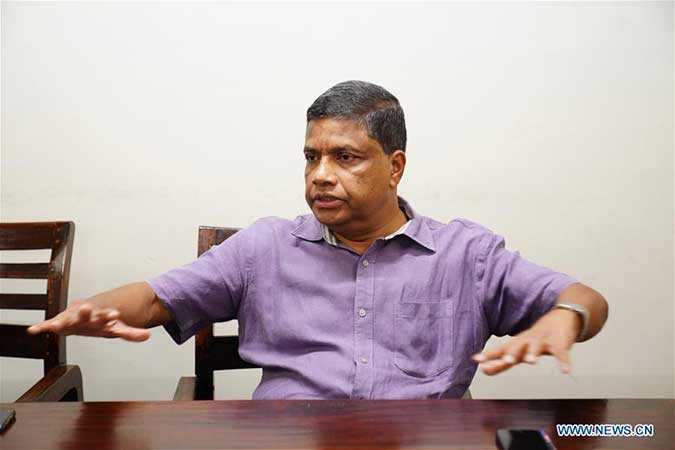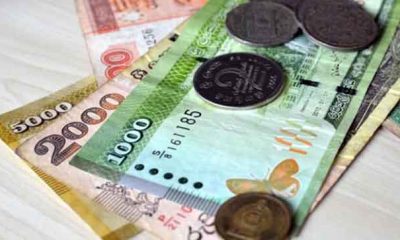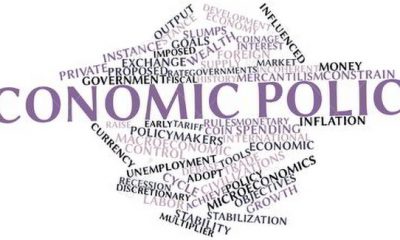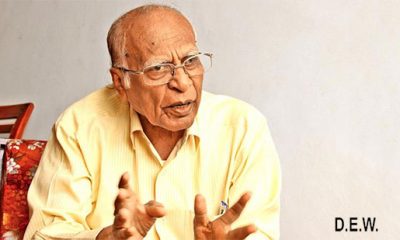News
CP Leader warns of danger of being at mercy of the dollar with it likely to lose its world reserve currency status

Suggests looking at India and China as alternative options
By Rathindra Kuruwita
The United States has printed trillions of dollars in the past year and Sri Lanka will be at the mercy of its volatility unless it looks at ways to reduce its dependence on the dollar, General Secretary of the Communist Party of Sri Lanka (CPSL) Dr. G. Weerasinghe told The Island on Wednesday.
The CPSL recently released a policy manifesto, Idirimagin Idiriyata, at the party’s 80th anniversary and proposed an alternative development mechanism.
After several centuries, the centre of world economy has shifted to Asia, and it has opened up new developmental avenues for Sri Lanka, General Secretary of the Communist Party said. Speaking about the Idirimagin Idiriyata policy manifesto the CPSL launched on 03 July, he said that most Sri Lankan economists are western oriented and ignore new world trends.
“In the last 20-30 years, many Asian economies took off, but we couldn’t get on the bus. This is because our entire economy is oriented to the West. We don’t even think what the Chinese, Indian, Korean or Japanese market wants. Clearly they don’t need our tea or garments. We have to figure out what these new markets want,” he said. Dr. Weerasinghe added that China is the main business partner with 140 countries in the world. China and India do a lot of business together, despite the frequent clamouring by Indian media, he said. “China is the biggest market in the world. China has a 500 million strong middle class. We have to also seriously think of India, which is the most populous country in the world. What about ASEAN? CPSL calls for a reorientation of Sri Lanka’s trade policy,” he said.
The CPSL General Secretary said that de-dollarization and the availability of new payment platforms are also developments that Sri Lanka should look at. In recent years, it has become evident that the United States and a few of its allies are manipulating international institutions that were meant to be apolitical, he said.
“They are also using sanctions to punish countries that do not bow down to the West. They are misusing the fact that the U.S. Dollar is the reserve currency of the world. They have also used payment platforms like SWIFT which was said to be beyond politics. A lot of countries have seen what happened to Iran and Russia and are worried that the same fate would befall them. Most major powers in the world are thinking about using alternative currencies to do business between each other. They have also looked at payment gateways like Mir,” he said.
Dr. Weerasinghe said that the US and EU imposed sanctions on about 6000 products on Russia following the Ukrainian war. Without being daunted, it rearranged its economy towards Asia and have managed to escape economic collapse. This made many major powers realize that the US and EU can only influence them, if U.S. dollars are used for trade.
“De-dollarization has gained momentum ever since. Russia, Iran and a few other countries have been kicked out of SWIFT,” he said.
Dr. Weerasinghe said that Sri Lanka has now decided that the Chinese Yuan and the Indian rupee can be used for trade. Some elements are insisting that this would be bad for the country without giving a rational explanation, he said.
The CP General Secretary mentioned that there are a few new development banks in the world, i.e. the BRICS bank and the AAIB. Sri Lanka only depends on the World Bank, IMF, etc., and these establishments have been tools of the West to impose its hegemony on the rest of the world, he said.
Dr. Weerasinghe added that until 1978, Sri Lanka took a number of progressive steps to defeat colonialism, and to industrialize. It attempted to formulate its own drug policy with Dr. Senaka Bibile, which is now widely respected around the world.
However, everything changed after 1977 and the problems created from the shift in the economic policy culminated with the current economic crisis, he said.
“Almost all governments, since 1977, have followed policies that were inimical to the agriculture and manufacturing sectors. We moved to low paying and low-productivity service jobs. It is a well-known fact that all nations that joined the developed nations club in the last 60 years focused on labour intensive manufacturing and boosting agricultural productivity. This is the history of development, but we have decided to ignore, it since 1977,” he said, adding that the institutions set up to ensure adherence to the Washington Consensus, i.e. World Bank and the IMF dictates, had encouraged deindustrialization in Sri Lanka.
“In fact, a 2003 agreement we signed with the IMF says that the Sri Lankan government will not take steps to develop industrialization,” he said.
The CPSL General Secretary said that as the state had lost both tax and non-tax revenue, it was compelled to borrow, especially from the International Sovereign Bond (ISB) markets.
“We started borrowing from these markets in 2007. Up until 2015, we borrowed about 30 percent of our total debt from ISBs. Between 2015 and 2019, we borrowed over 13 billion US dollars from these markets. These bonds are held by companies based in the US and the EU. They are literally poli mudalalis (loan sharks). Borrowing from these markets has ruined us. However, there is a big campaign by the West and its local allies to place the blame on China,” he said.
News
US sports envoys to Lanka to champion youth development

The U.S. Embassy in Colombo welcomed the U.S. Sports Envoys to Sri Lanka, former National Basketball Association (NBA) and Women’s National Basketball Association (WNBA) players Stephen Howard and Astou Ndiaye, from June 8 through 14.
The Public Diplomacy section of the U.S. Embassy said that it would launch a weeklong basketball program intended to harness the unifying power of sports, made possible through collaboration with Foundation of Goodness and IImpact Hoop Lab.
While in Sri Lanka, Howard and Ndiaye, both retired professional basketball players, will conduct a weeklong program, Hoops for Hope: Bridging Borders through Basketball. The Sports Envoys will lead basketball clinics and exhibition matches and engage in leadership sessions in Colombo and Southern Province for youth aged 14-18 from Northern, Uva, Eastern and Western Provinces, offering skills and leadership training both on and off the court. The U.S. Envoys will also share their expertise with the Sri Lanka Basketball Federation, national coaches, and players, furthering the development of basketball in the country. Beyond the clinics, they will collaborate with Sri Lankan schoolchildren to take part in a community service project in the Colombo area.
“We are so proud to welcome Stephen and Astou as our Sports Envoys to Sri Lanka, to build on the strong people-to-people connections between the United States and Sri Lanka,” said U.S. Ambassador Julie Chung. “The lessons that will be shared by our Sports Envoys – communication, teamwork, resilience, inclusion, and conflict resolution – are essential for leadership development, community building, equality, and peace. The U.S. Sports Envoy program is a testament to our belief that sports can be a powerful tool in promoting peace and unity.”
News
Rahuman questions sudden cancellation of leave of CEB employees

SJB Colombo District MP Mujibur Rahuman in parliament demanded to know from the government the reasons for CEB suspending the leave of all its employees until further notice from Thursday.
MP Rahuman said that the CEB has got an acting General Manager anew and the latter yesterday morning issued a circular suspending leave of all CEB employees with immediate effect until further notice.
“We demand that Minister Kanchana Wijesekera should explain this to the House. This circular was issued while this debate on the new Electricity Amendment Bill was pending. There are many who oppose this Bill. The Minister must tell parliament the reason for the urge to cancel the leave of CEB employees,” the MP said.However, Speaker Mahinda Yapa Abeywardena prevented Minister Wijesekera responding to the query and said that the matter raised by MP Rahuman was not relevant.
News
CIPM successfully concludes 8th Annual Symposium

The Chartered Institute of Personnel Management (CIPM) successfully concluded the 8th Annual CIPM Symposium, which took place on 31st May 2024. Themed “Nurturing the Human Element—Redefining HRM in a Rapidly Changing World,” the symposium underscored the pivotal role of human resource management (HRM) in today’s dynamic global landscape. Since its inception in 1959, CIPM has been dedicated to advancing the HR profession through education, professional development, and advocacy, solidifying its position as Sri Lanka’s leading professional body for HRM.
Ken Vijayakumar, the President of the CIPM, graced the occasion as the chief guest. The symposium commenced with the welcome address by the Chairperson, Prof. Arosha Adikaram, followed by the Web Launch of the Symposium Proceedings and Abstract Book by the CIPM President. The event featured distinguished addresses, including a speech by Chief Guest Ken Vijayakumar, President of CIPM, and an address by Guest of Honor Shakthi Ranatunga, Chief Operating Officer of MAS Holdings Pvt. Ltd., Sri Lanka.
The symposium also featured an inspiring keynote address by Prof. Mario Fernando, Professor of Management and Director of the Centre for Cross Cultural Management (CCCM) at the University of Wollongong, Australia.
Vote of Thanks of the inauguration session was delivered by Dr. Dillanjani Weeratunga, Symposium Co-chair.
The symposium served as a comprehensive platform for researchers to present their findings across a wide range of critical topics in HRM. These included Cultural Diversity and Inclusion, Talent Development and Retention, Ethical Leadership and Corporate Social Responsibility, Adapting to Technological Advancements, Mental Health and Well-being at Work, Global Workforce Challenges, Employee Empowerment, and Reskilling and Upskilling.
The plenary session was led by Prof. Wasantha Rajapakse. Certificates were awarded to the best paper presenters during the valedictory session, followed by a vote of thanks delivered by Kamani Perera, Manager of Research and Development.
The annual symposium of CIPM was a truly inclusive event, attracting a diverse audience that spanned undergraduates, graduates, working professionals, research scholars and lecturers. This widespread interest highlights the symposium’s significance in the field of HRM, offering a unique opportunity for everyone to network and learn from scholarly brains.The CIPM International Research Symposium was sponsored by Hambantota International Port, Sri Lanka Institute of Information Technology (SLIIT), E B Creasy & Co. PLC, and Print Xcel Company.


















